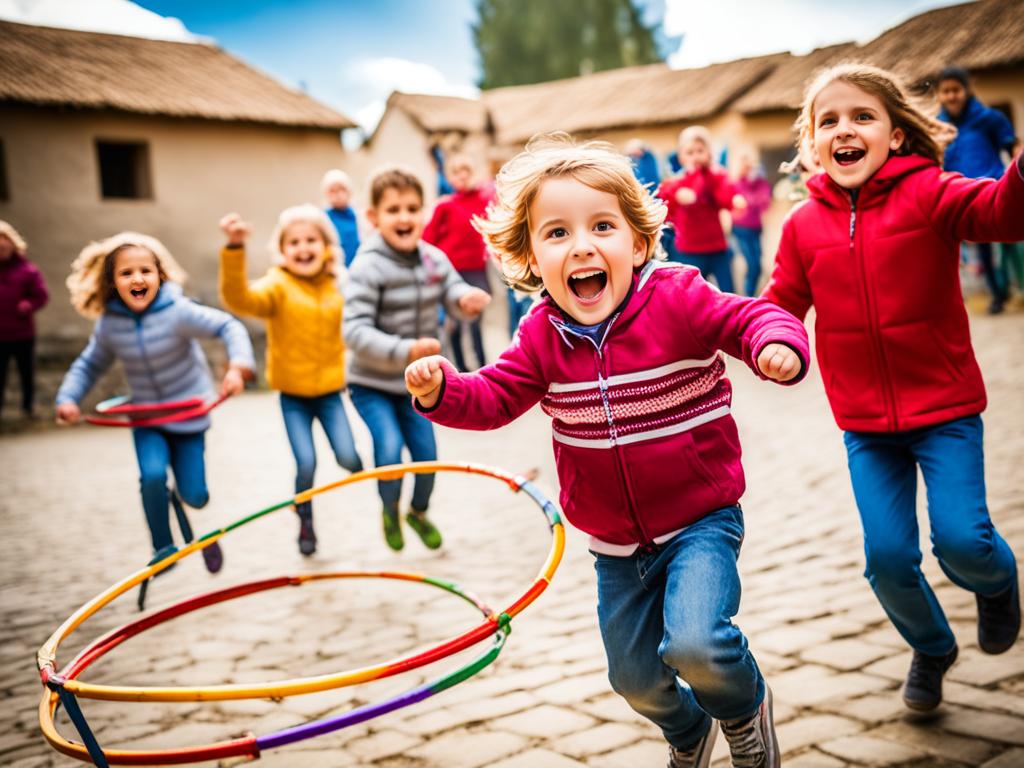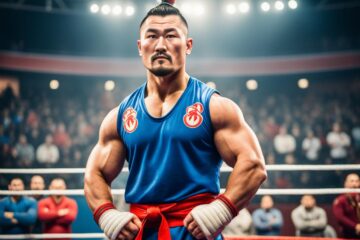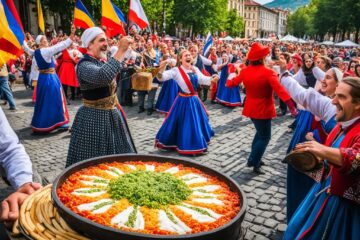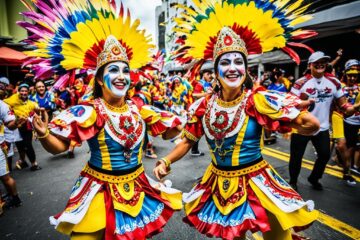Picture this: the sound of laughter fills the air as families gather round. They’re all excited for some friendly competition. That’s Seollal, or the Lunar New Year, in South Korea. It’s a special time full of traditions, family love, and happiness.
In South Korea, Seollal means celebrating with family and looking forward to a new year. People enjoy games that are part of their tradition. These fun activities mean more than just entertainment. They stand for coming together, working as a team, and wishing for good luck in the year to come.
Key Takeaways:
- Seollal is a big deal in South Korea for coming together with family.
- Playing traditional games is a heartwarming part of Seollal.
- These games are about being united, working together, and hoping for luck in the new year.
- Seollal is about getting closer to family, remembering ancestors, and looking forward to a fresh start.
- It’s a joyful time celebrating with those you love.
Traditional Games of Seollal
Seollal features fun traditional games. They offer more than just joy. These games show the importance of coming together, teamwork, and hoping for a lucky year.
Yutnori
Yutnori is a hit at Seollal. You throw four sticks, then move your piece on the board. The goal is to finish first. It takes luck, smart moves, and team play to win.
Jegichagi
A game called jegichagi tests your aim and skill. You use your feet to kick a shuttlecock, or jegi, in the air. The more you keep it up, the better. It’s challenging and fun, whether playing alone or with friends.
Neolttwigi
Neolttwigi is a seesaw game that’s all about working together. Two players stand on each end, trying to leap off the ground. It takes teamwork, timing, and balance. This makes it not only exciting but also an eye-catching game.
These games have a long history and are key to Seollal. They let families unite, enjoy, and connect. Also, they help keep South Korea’s cultural traditions alive.
Customs and Rituals of Seollal
Seollal, known as Lunar New Year, brings South Korean families together in celebration. This holiday is joyful and full of cultural traditions. The main custom involves showing respect to ancestors and elders, emphasizing the value of honoring those before us.
Bowing is a key part of Seollal. Younger family members bow to elders for a good year. This shows respect, strengthens family ties, and wishes for a lucky future. It symbolizes the passing of wisdom from older to younger generations, showing the importance of family and thanks.
“During Seollal, we gather as a family and pay our respects to our ancestors. It’s a time for reflection, honoring our roots, and expressing gratitude for the sacrifices they made.”
– Lee Joo-hee, a South Korean native
Ancestor worship is also central to Seollal. People visit ancestral graves, leaving food and more to remember their ancestors. This act ensures the well-being and guidance from the past, recognizing their impact on today and tomorrow.
People wear hanbok during Seollal. This traditional Korean clothing is known for bright colors and detailed designs. It highlights the cultural pride during Seollal while adding to the festive spirit.
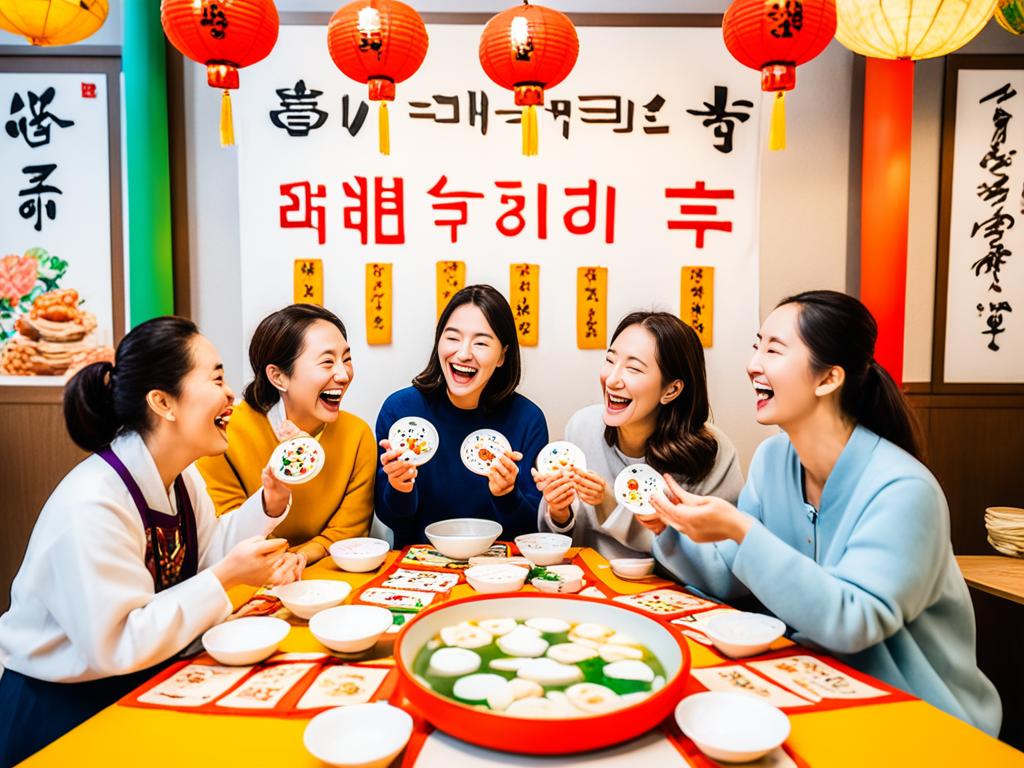
Seollal is very important for Koreans, signaling family and tradition. Through practices like bowing and wearing hanbok, Seollal brings unity and pride. It’s a time for showing gratitude and celebrating the culture’s strong roots.
Traditional Seollal Foods
Seollal is a time for joy and family, marked by eating certain foods. These dishes are not just tasty but also important culturally. Some notable Seollal foods are seen as classics and are a must during the holiday.
Tteokguk: A highlight of Seollal is tteokguk, a soup with rice cakes. It’s not just delicious but also carries deep meaning. The soup’s round shape and soft texture symbolize unity and are thought to bring luck in the new year.
Jeon: Jeon is another vital food during Seollal. It’s basically savory pancakes, made with veggies, meat, or seafood. These crunchy pancakes are a hit at holiday gatherings, loved by everyone.
Yakgwa: If you love sweets, try yakgwa during Seollal. These honey pastries are deep-fried and come in beautiful shapes. They’re a favorite dessert, perfect for celebrating the festive season.
Traditional Seollal Foods Table
| Seollal Foods | Description |
|---|---|
| Tteokguk | A savory rice cake soup that symbolizes new beginnings and good luck for the coming year. |
| Jeon | Savory pancakes made with various ingredients like vegetables, meat, or seafood. |
| Yakgwa | Deep-fried honey pastries that offer a delightful blend of sweetness and crunch. |
Seollal foods bring joy and gather people together. They’re key in celebrating the holiday, making it special. Tteokguk, jeon, and yakgwa are central to Seollal, representing Korean culture and the holiday’s true spirit.
Significance of Seollal in South Korean Culture
Seollal, the Lunar New Year, is very important in South Korean culture. It means more than just a holiday. It stands for family, culture, unity, and starting fresh.
Families gather from near and far for Seollal. It’s a time to share and strengthen bonds. Everyone takes a break to focus on spending time together. This focus on family values brings love, respect, and closeness.
Seollal marks a new year, bringing fresh beginnings and new hopes. It’s a time for thinking ahead and focusing on personal growth. The traditions of Seollal are key in upholding cultural identity and valuing heritage.
The customs and celebrations of Seollal show Korean unity. It’s when people join together, setting differences aside. They bond over common experiences, building deeper societal connections.
“Seollal is not just a holiday; it is a celebration that reflects the deep-rooted values of love, respect, and unity within South Korean culture.” – Lee Joo-hwan, Cultural Historian
Seollal isn’t just a holiday; it’s about family and new starts. Its meaning in Korean culture is manifold. It strengthens family values, celebrates culture, and motivates for the new year.
| Keyword | Definition |
|---|---|
| Family values | The moral and ethical principles that guide familial relationships and interactions, emphasizing love, respect, and support within the family unit. |
| Cultural identity | The sense of belonging, shared values, and traditions that define a group or community. |
| Unity | The state of being united or joined, it speaks of solidarity within a community or society. |
| New beginnings | The start of something new, echoing setting goals and taking a fresh journey. |
Conclusion
Seollal is the Lunar New Year in South Korea, celebrating with great joy and togetherness. It offers a peek into South Korean culture through traditional games and special meals. This time is all about family, remembering ancestors, and starting fresh.
Participating in Seollal customs helps South Koreans find themselves and value family more. The games during this time, besides being fun, also bring people together, encouraging teamwork and hoping for a good year. They underscore the need to cherish close bonds.
Seollal spreads a feeling of happiness by bringing families closer. It’s about being together, respecting old customs, and making memories. This occasion highlights South Korea’s rich heritage and the importance of family in its culture. Seollal captures the spirit and values of South Korea in a beautiful way.
